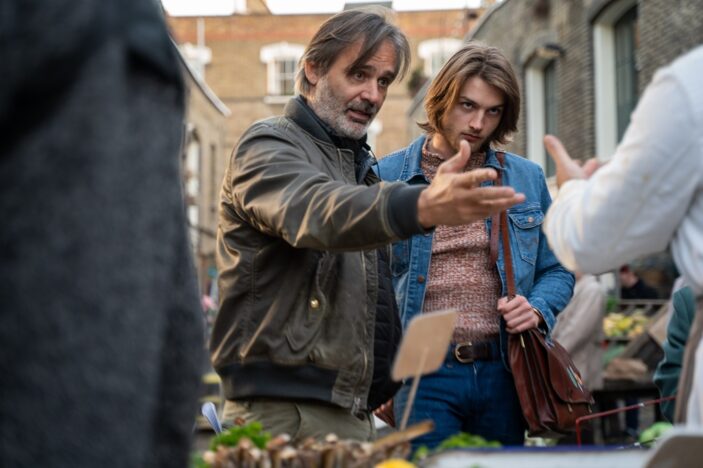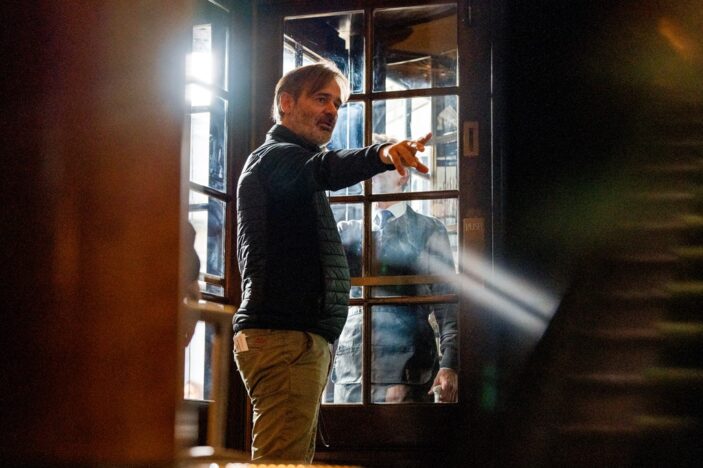
The last time our Peter Gray spoke with director Baltasar Kormákur it was when he was placing Idris Elba in the biting line of a ferocious lion in 2022’s underrated survivalist actioner Beast.
For his latest turn behind the camera, the Icelandic filmmaker couldn’t be further from the dangerous throws of South Africa with his tender romantic drama Touch, a love story years and miles in the making.
Based on the Icelandic best-selling novel by Ólafur Jóhann Ólafsson, Touch is a romantic and thrilling story that spans several decades and continents, following one widower’s emotional journey to find his first love who disappeared 50 years ago, before his time runs out.
To coincide with the film’s Australian release, Peter reunited with Baltasar to talk about what drew him to such a project, how the pandemic changed his perception of time, and how the story opened itself to him during the editing process.
Hello Baltasar. I spoke to you a few years ago for your film Beast, so it’s lovely to speak to you again.
I do recall. I see so many faces doing press, but I do remember you.
I feel like everyone will look at Touch as being something different for you, but that’s mainly in comparison to your American work. I feel like your earlier films are more in touch with Touch, as well as your theatre work. Was that the appeal of doing this film? Something that was different, yet familiar at the same time…
Yes. The appeal was to tell a story that I hadn’t had the opportunity to tell. I’m not getting those kinds of scripts sent to me in Hollywood, to be honest. So you create it for yourself, you know? And for me, I have many sides to myself. My career has come out of instinct and just project by project. I never think “Oh, I have to do this and this…”, it’s more that I choose something that I connect with.
Even with a project like Beast. I was a fan of lions when I was a kid. I was going to Africa, and I thought there’s so many elements to explore that I’d like to do that one. In the case of Touch, I had wanted to tell a love story for a while. I’ve done Shakespeare’s ‘Hamlet’ twice, and all different kinds of things in theatre, and my second feature, The Sea, is a family drama, but that was a very different kind of love story. That was more of a twist on the romantic comedy. A bit of a black romantic comedy, if you could call it that.
With Touch I wanted to tell a more sincere story. A more honest story. (To) reflect on my own relationship with love has been through the years. And what was most important to me was the need for closure, which is something that kind of weighs heavily on you as you get older.
I feel like the pandemic kind of opened up so much for people. It’s kind of ironic that we were so shut away and yet it opened up our relationships so much more. In Touch, you have this character who’s mourning, but he’s hopeful. There’s always more to life.
And I learned that by going to a psychiatrist (laughs). It’s never too late to fix a relationship. You think that maybe there were things that you’re angry about when you were younger, and is there much time with your parents getting old? It’s not about time. If you’re 80, it’s still worth it, you know? I think we often look at it in such a way as it’s too late. It’s never too late. Life is now!
And, for me, I loved the idea of this character being unpredictable in his choices. When he’s young he goes and does things, like walk out of school and gets a job at a Japanese restaurant. And it’s gentle, with no force. When we’re young we do kind of walk into weird situations, but after the trauma of this character having his love ripped away from him, someone he was deeply in love with, he just shuts down and goes back home. The adventure kind of stops in his life. He marries a beautiful woman, but he knows that she deserves better than him, you know?
He’s never really lived a full life, and now he’s a younger version of himself. He gets a tattoo, for example, something that he never would have done 50 years ago. And I love that. When we become fathers or mothers, I think sometimes we tame ourselves. But he wants to be “himself”, and I think when people get the chance to have a do-over, they have new ideas of what it is to be a grown up.
I also think it’s about facing our mortality in some way.
It’s almost like counting down to the end of the world a little bit, you know? Let’s just fucking party! But I love the fact that the pandemic, in the beginning, was so abstract. You know, we’d go into a shop and we’d have to wait in the corner, because only 20 people were allowed in the store. But now, it’s fine. I didn’t want to make a heavy-handed COVID film.

It isn’t heavy-handed, as you say. I did love the scene where he’s in the restaurant and he’s all alone, and he’s still being told he can’t be on his phone or do certain things. He’s the only one there!
(Laughs) How many times did we go through stuff like that? In Sweden I went to a shop to buy some cameras and film. I went in and there was no-one there, and they told me I had to get in line and take a number. It’s like “What the???”
The way the film is structured with the time jumps, was that something you found presented itself more so in the edit? Or did you always envision going back and forth in the narrative as we see?
We had to tell the story that way. It was written that way. But there was a lot to discover in the edit. And my fantastic editor (Sigurður Eyþórsson), we worked a long time, and it was so much about balancing. We tried different things. The first act was a little hard to get, because you want to get (the audience) going, but, at the same time, you want to introduce these characters and enjoy it. Some stuff, some really beautiful scenes, had to come out, but, in the end, it very much told a story in the most economic way possible. We had time to allow the camera to sit with the faces of these characters. It’s all in the little tweaks and smiles, and half-smiles, of the moments when it burns between the lovers. It’s all the stuff that’s unsaid.
Did you find that was one of the biggest challenges, in terms of storytelling, in finding what was most important? Or, as you said, it was those little moments for the characters that made you opt for that as a storytelling feature over exposition?
I think I was pretty clear from the beginning, but once you start getting into those scenes, and once I started taking out some of the dialogue – because you tend to write more than you actually need – I saw the breathing room for the actors. Sometimes dialogue can disrupt the chemistry of what is actually going on, so you need those moments for the actors to reflect on each other.
Touch is screening in select Australian theatres from August 22nd, 2024.
